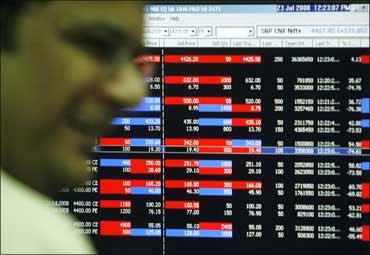
A salaried individual needs to file I-T returns as a business owner if s/he has a high turnover while trading in stocks or futures & options, reveals Tinesh Bhasin.
With the markets witnessing a bull run and several well-received initial public offerings (IPOs) hitting it at regular intervals, individuals have begun to increasingly dabble in stocks directly.
According to reports, as many as 2.4 million new demat accounts were opened in 2016, the highest since 2008.
If you traded in stocks, filing income tax (I-T) returns can get tricky.
Gains and losses are treated differently for I-T purposes, based on whether you took delivery of stocks, did intra-day trading, or traded in the futures and options segment.
How you go about filing your returns also depends on the frequency and number of transactions.
Choose the correct ITR form
If all the buying and selling you engaged in was delivery-based and the total turnover of trades was only a fraction of your income, the filing of tax returns is straightforward.
You need to fill up the ITR-2 form.
If you sold stocks in less than 12 months, you need to pay a short-term capital gains tax of 15 per cent on your gains.
If some stocks were sold off at a loss, the short-term capital loss can be adjusted against short-term capital gains in the same year to reduce your tax liability.
"You can set off these losses against gains made on selling a property, gold, stocks, debentures, or any capital asset," says Kuldip Kumar, partner and leader, personal tax, PwC India.
But if you held shares for more than a year and sold them off at a loss, you cannot set off those losses against long-term gains.
This is because long-term gains don't attract any tax.
Complications in tax filing arise if you buy and sell stocks frequently and have a high turnover.
In that case, you will need to file returns as a business owner and opt for an ITR-4 form.
"If an individual transacts only to benefit from price fluctuation, then the I-T department does not consider it as an investment," says Preeti Khurana, chartered accountant and tax expert at Cleartax.in.
Whether the individual intended to profit from price movement or s/he wished to benefit from the company's growth has been a point of contention for many years.
Assessing officers take a call based on the nature of transactions.
Khurana says they look at two parameters before advising a salaried individual to file returns as a business owner.
One, if the turnover from trading is close to the salary, the taxpayer is considered a trader.
Two, they look at the frequency of transactions.
If there is constant buying and selling, it indicates the person wants to benefit from price fluctuation and is not an investor.
In case an individual cannot establish himself as a trader or investor, it's better to file tax return as a business owner.
The same principles apply if you are a professional, freelancer, housewife, retiree, or have your own business.
While filing returns, don't show stock market transactions under the head capital gains (in the ITR form) if you trade frequently.
If you trade in derivatives or have engaged in intra-day trading, the profits or losses made are straightaway considered as business income.
Even if your derivative transactions are a fraction of your salary or are not frequent, you still need to file income tax as a business owner and opt for ITR-4.
Tax experts say even if you have just four or five derivative trades, it's better to opt for ITR-4.
Filing returns as a business owner
The first step is to look at the profit and loss details of your business.
To calculate gross income from transactions, take your transaction statement for the whole financial year and sum up all your transactions.
As a business owner, you can deduct expenses from gross income and bring down your tax liability.
Some that you can deduct include rent or maintenance expenses of premises used for the business; mobile or telephone bills; Internet charges; demat account charges; broker's commissions; depreciation on a laptop used for trading; and any other expense related directly to your work.
But ensure that all the expenses are genuine as many assessees also receive tax notices asking them to explain the expenses incurred.
You will also have to prepare a balance sheet which is reported in ITR-4.
It is a statement of your assets and liabilities.
Claiming losses
As a business owner you can also carry forward your losses for up to eight financial years and offset them against the gains in subsequent years.
The provisions for losses, however, differ for F&O and intra-day trades.
If you have F&O losses, you can set them off against rental and interest income in the same assessment year, and also against gains made on any investment.
You cannot deduct losses from salary though.
If you are carrying forward the losses, you can only set them off against capital gains in subsequent years.
For those who have done intra-day trades, the tax department considers such transactions as 'speculative income'.
It means, the losses can only be adjusted against gains made in 'speculative business' and can be carried forward only for four years.
"Taxpayers can benefit from these provisions only if they file taxes on time. They also need to get their books audited. In case of delays, one cannot carry forward losses," says Vikram Ramchand, founder, Makemyreturns.com.
Getting your books audited costs upwards of Rs 25,000. Before you show losses, ensure that this cost is covered, or else omit them.
Photograph: Reuters











